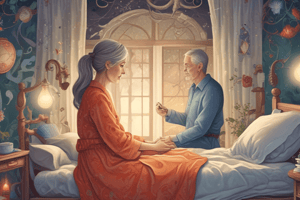Podcast
Questions and Answers
What is the primary characteristic of somnambulism?
What is the primary characteristic of somnambulism?
- Talking during sleep
- Excessive daytime sleepiness
- Performing complex behaviors while asleep (correct)
- Inability to move or speak while falling asleep or waking up
Which symptom of narcolepsy is triggered by strong emotions?
Which symptom of narcolepsy is triggered by strong emotions?
- Vivid hallucinations
- Cataplexy (correct)
- Sudden attacks of sleep
- Excessive daytime sleepiness
What regulates the sleep-wake cycle and hormone secretion in the body?
What regulates the sleep-wake cycle and hormone secretion in the body?
- Light-dark cycle
- Suprachiasmatic nucleus
- Melatonin levels
- Circadian rhythms (correct)
What is the term for talking during sleep, often without awareness of the conversation?
What is the term for talking during sleep, often without awareness of the conversation?
Disruptions to which bodily function can lead to sleep disorders, jet lag, and other health problems?
Disruptions to which bodily function can lead to sleep disorders, jet lag, and other health problems?
What is the common mode rejection ratio a measure of in an amplifier?
What is the common mode rejection ratio a measure of in an amplifier?
What is the typical common mode rejection ratio of a high-quality polysomnography system?
What is the typical common mode rejection ratio of a high-quality polysomnography system?
What can cause electrical interference that is difficult to distinguish from true biopotentials?
What can cause electrical interference that is difficult to distinguish from true biopotentials?
What can occur when there is unequal impedance between electrodes?
What can occur when there is unequal impedance between electrodes?
What can cause biopotentials of equal amplitude at the scalp to appear with different amplitudes at the amplifier input?
What can cause biopotentials of equal amplitude at the scalp to appear with different amplitudes at the amplifier input?
Flashcards are hidden until you start studying
Study Notes
Sleep Medicine
Insomnia
- Definition: Difficulty initiating or maintaining sleep, or both, despite adequate opportunity and circumstances for sleep.
- Prevalence: Affects 10-30% of adults, with higher rates in women and older adults.
- Types:
- Acute insomnia: Lasts for a short period, often triggered by stress or traumatic events.
- Chronic insomnia: Lasts for at least 3 months, often accompanied by underlying medical or psychological conditions.
- Symptoms:
- Difficulty falling asleep or staying asleep
- Waking up frequently during the night
- Waking up too early in the morning
- Feeling tired or unrefreshed upon waking
Sleep Apnea
- Definition: A sleep disorder characterized by repetitive episodes of shallow or paused breathing during sleep.
- Types:
- Obstructive sleep apnea (OSA): Caused by blockage of the airway, often due to excess tissue in the throat or obesity.
- Central sleep apnea (CSA): Caused by a lack of respiratory effort, often due to neurological disorders or heart failure.
- Symptoms:
- Loud snoring
- Pauses in breathing during sleep
- Waking up with a dry mouth or sore throat
- Morning headaches
- Excessive daytime sleepiness
Sleep Disorders
- Definition: A group of disorders that affect the quality, duration, or timing of sleep.
- Examples:
- Restless leg syndrome (RLS): Uncomfortable sensations in the legs, leading to an urge to move them.
- Periodic limb movement disorder (PLMD): Repetitive movements of the legs or arms during sleep.
- Sleepwalking (somnambulism): Performing complex behaviors while asleep, often without memory of the event.
- Sleep talking (somniloquy): Talking during sleep, often without awareness of the conversation.
Narcolepsy
- Definition: A chronic neurological disorder characterized by excessive daytime sleepiness and sudden attacks of sleep.
- Symptoms:
- Excessive daytime sleepiness, often accompanied by a sudden need to sleep
- Sudden attacks of sleep, often without warning
- Cataplexy (muscle weakness or paralysis) triggered by strong emotions
- Sleep paralysis (inability to move or speak) while falling asleep or waking up
- Vivid hallucinations or dream-like experiences
Circadian Rhythms
- Definition: The internal biological processes that regulate the sleep-wake cycle, hormone secretion, and other physiological functions.
- Mechanisms:
- Suprachiasmatic nucleus (SCN): The master clock that regulates the circadian rhythm.
- Light-dark cycle: Exposure to natural light and darkness helps synchronize the SCN with the 24-hour day.
- Importance:
- Regulates sleep-wake cycles, hormone secretion, and metabolism
- Influences mood, cognitive function, and overall health
- Disruptions to circadian rhythms can lead to sleep disorders, jet lag, and other health problems
Studying That Suits You
Use AI to generate personalized quizzes and flashcards to suit your learning preferences.





